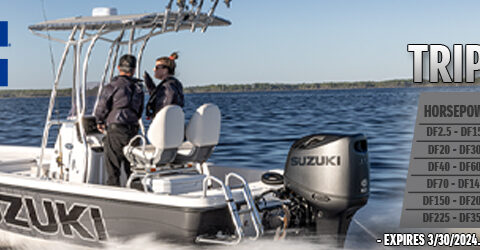Prepare Your Trailer for the Boating Season
It might be your boat that gets all your love and attention, but it’s just as important to give your trailer some TLC. After all, if your trailer experiences problems, you won’t be doing much boating. Here are a few tips to make sure your trailer is in good condition for the upcoming boating season.
- Check your tires. Inspect your trailer’s tires to make sure they are in good condition. Look for cracks in the side walls, check the treads for irregular wear and make sure your tires are properly inflated. (And don’t forget to check the condition of your spare.) You should also check your rims to make sure they aren’t rotted away. Rot will often appear on the inside of the rim, and the rust can get so bad that it will no longer hold air.
- Inspect your brakes. Make sure your brakes are working. If they are hydraulic, check the fluid level.
- Check your trailer bearings and spindle. Repack the trailer bearings and inspect the spindle for wear. Make sure to use a quality bearing grease.
- Inspect the coupler. Make sure your coupler is in working order. It may need grease. Also, ensure the ball is tightly secured to the hitch on the vehicle. These can rust on the surface and should be cleaned with a light layer of grease.
- Check the electrical system. Look over your trailer’s electrical system, checking for broken wires, corrosion and bad bulbs. People often dunk the trailer lights, and when they don’t get properly rinsed they rot from the inside out. Even if the lens looks fine, the light sockets might be ruined. Test your lights before leaving your driveway.
- Look for damaged rollers. Make sure your rollers and hog rings are not damaged. A bad or damaged roller can unexpectedly come off, damaging the hull of the boat when launching or loading.
- Replace carpet. If the carpet on your bunk trailer is torn, make sure to replace it. Inspect the hardware that holds the bunks. You will often find rust and corrosion where they fasten to the underside of the bunk. When the wood gets wet, water gets trapped between the steel and the wood, creating a perfect environment for corrosion.
- Clean your steel trailers. Make sure to clean any rust off steel trailers and treat the surface with cold-galvanizing compound. Not only will this make the trailer look better, but it will also protect the steel from rusting more.
- Inspect your fenders. Look at the fenders over the wheels. If they are cracked or damaged, considering replacing them. Fenders often get cracked when people step on them to get in the boat while it’s on the trailer. If the fenders are damaged, road debris like rocks and loose asphalt can get kicked up and damage your hull.
- Inspect your winch. Check the winch cable or strap for any fraying or tears. Also, inspect your tie down straps. Replace any that are worn or damaged.
- Check your trailer jack. Inspect the wheel or foot of your trailer jack and make sure it still cranks up and down through the full range of the jack. Some models have grease fittings that should be greased.
- Check your suspension. Spring style trailer axles often rust at the spring seat. This is the most common place for an axle to fail. The saltwater gets trapped between the metal and it rusts. If the springs are really rusted, they can be cleaned and painted, but it is often better to replace them. Torsion axles have less issues, but they are still susceptible to rust. You can find aftermarket torsion axles to replace most spring style axles.
- Look over your fasteners. Inspect your whole trailer, checking all the fasteners for tightness. Even if they have been torqued, nuts and bolts will sometimes vibrate loose on trailers.





